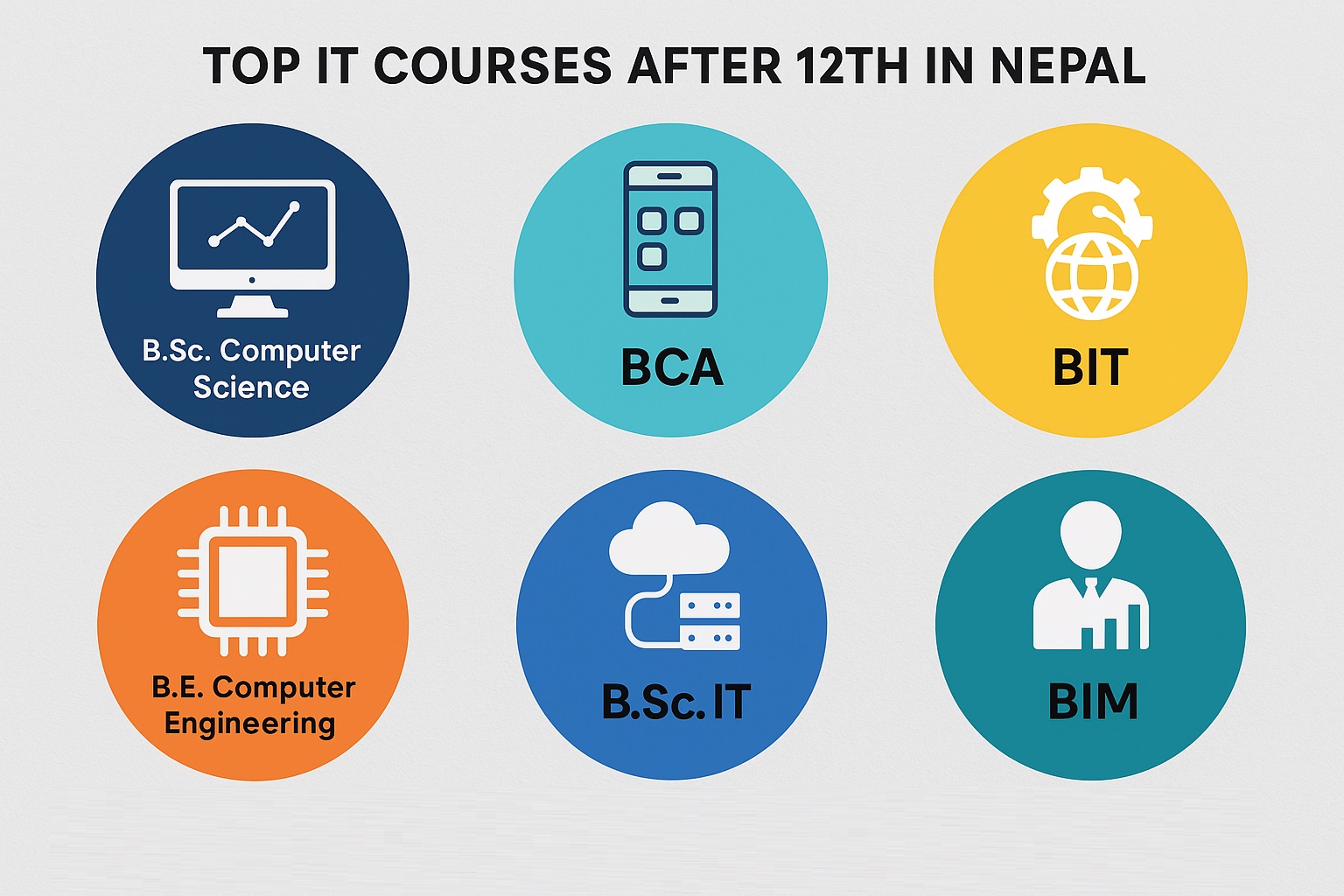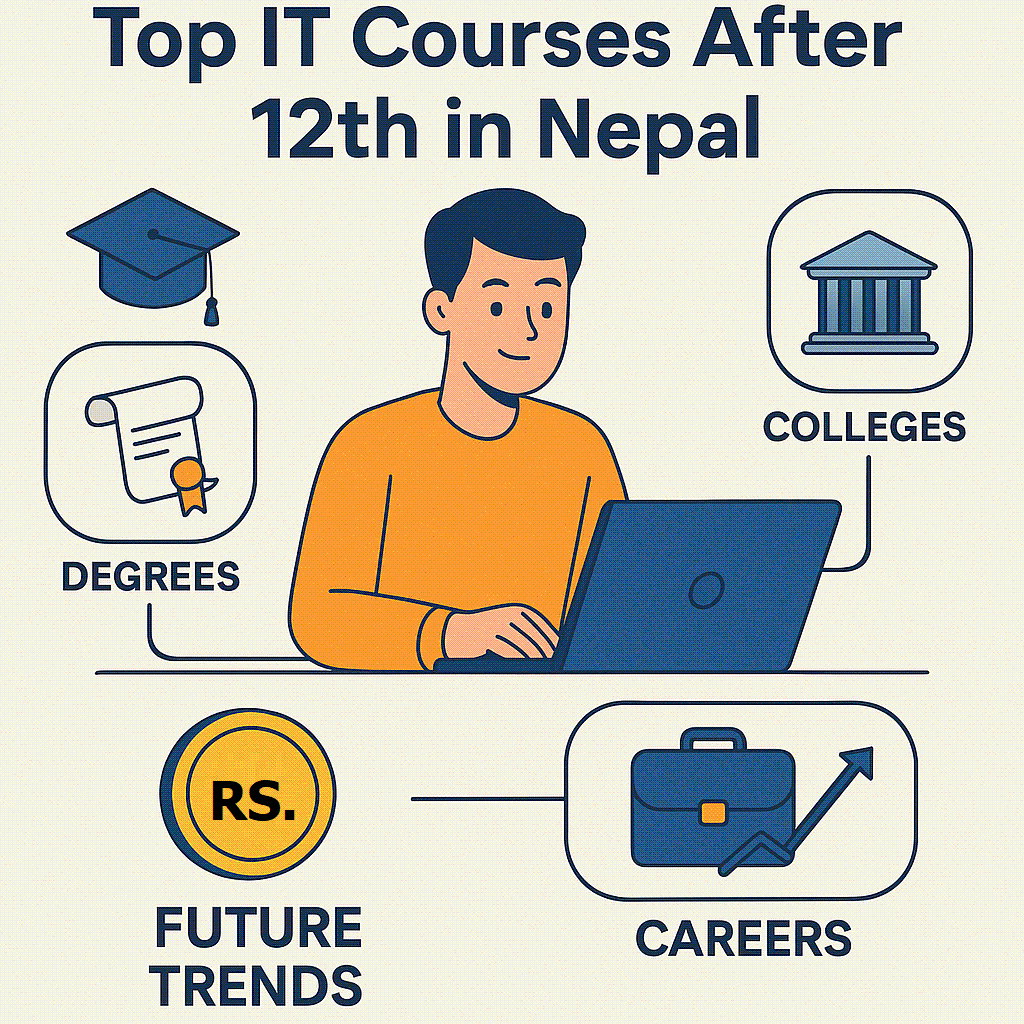
Why More Students in Nepal Are Choosing IT After 12th
Information Technology (IT) is no longer a distant subject tucked away in urban centers or limited to computer geeks. It’s something that touches nearly every corner of life. In Nepal, the demand for skilled IT professionals has grown steadily—not just in Kathmandu Valley, but across districts where digital access is expanding.
So, why are more students turning to IT after their +2? Because it’s practical. It’s current. And it offers real opportunities for employment—locally and globally. With the right training, a student from Kailali or Khotang can be writing code for a client in Germany or helping a startup in Lalitpur build its first mobile app.
Understanding the IT Education Landscape in Nepal
Nepal offers a diverse set of IT programs through universities like Tribhuvan University (TU), Kathmandu University (KU), Pokhara University (PU), Purbanchal University, and Mid-Western University. In addition, the Council for Technical Education and Vocational Training (CTEVT) and various private institutions provide diplomas and certifications that focus on technical skills.
You’ll find courses offered under different names—BSc CSIT, BIT, BIM, BCA, and BTech IT—but each comes with its own eligibility criteria and focus. What unites them is a growing alignment with job market demand, especially in fields like software development, cybersecurity, data science, and networking.

Eligibility Criteria
Yes—but with conditions. The first step is completing your +2 education or an equivalent (like A-levels or CBSE), recognized by the Ministry of Education or the National Examination Board (NEB).
Minimum Academic Requirements
-
GPA between 2.0 to 2.4 depending on the institution
-
Minimum C grade in both English and Mathematics
-
For technical programs like BSc CSIT, you must have studied Physics and Mathematics
-
For BCA or BIT, having studied a 100-mark Computer or Math subject is often sufficient
Subject Stream: Science vs Management vs Humanities
If you studied under the Science stream, you’re eligible for all major IT programs. Those from Management or Humanities streams can still apply for BCA or BIT, provided they’ve taken Mathematics or Computer Science as a core subject.
This broadens access, making IT education more inclusive. However, success in IT doesn’t depend on your stream alone—it’s your interest, logical thinking, and problem-solving skills that matter.
Entrance Exams: Do You Need to Pass One?
For most public university programs, yes. Take BSc CSIT under Tribhuvan University, for example. It requires you to sit for an entrance exam that tests English, Mathematics, Logical Reasoning, and General Knowledge.
For BCA or BIT, some universities conduct entrance tests, while others rely on internal assessments. Always check the admission notice from the respective university.
Types of IT Courses Available in Nepal
You’ll find multiple pathways:
-
Bachelor-level degrees (BSc CSIT, BIT, BCA, BIM, BTech IT)
-
Technical diplomas (CTEVT, private institutions)
-
Short-term certifications (Python programming, Cisco, Oracle, etc.)
The degree you choose should reflect your career goals. Want to get into hardcore software engineering? Go for BSc CSIT or BTech IT. Want a career in IT management or applications? BIT or BCA can be more suitable.
Popular IT Degrees in Nepal
BSc CSIT (TU)
A four-year program that blends core computer science and information technology. Includes subjects like programming, AI, networking, and database management. Suitable for those with strong math and science background.
BIT (PU, TU, foreign affiliations)
Focuses more on application and system development with a balance of theory and practice. Slightly more flexible than CSIT.
BIM (TU)
Mixes IT with management courses. Ideal if you’re interested in business systems, ERP, and IT project coordination.
BCA (TU, PU, KU, others)
Open to students from all streams (with required subjects). More oriented towards software development and application programming.
BTech IT (KU)
A more technical and engineering-heavy course. You’ll need a strong foundation in physics and math.
Diplomas and Short-Term Certifications
If you’re not ready for a full degree, you can explore:
-
CTEVT IT Diploma
-
Networking (Cisco Certified)
-
Programming (Python, Java)
-
Web Development (Frontend, Backend)
These are valuable for those who want to get into the workforce early or upskill alongside a job.
What Skills Should You Have to Succeed in IT?
Technical qualifications alone aren’t enough. IT demands both hard and soft skills:
Technical Skills:
-
Logical thinking
-
Familiarity with programming concepts
-
Understanding of databases and networks
Soft Skills:
-
Communication
-
Teamwork
-
Time management
If you like solving puzzles or figuring out how things work, IT could be a strong fit. But if you find math intimidating or lose patience with systems, it might be a tougher road.
What Does It Cost to Study IT in Nepal?
Public Universities
-
BSc CSIT (TU): Approx. NPR 80,000–100,000 total
-
BCA (TU): NPR 60,000–90,000
Private Colleges
-
Range: NPR 3.5–6.5 lakhs
-
Some programs affiliated with foreign universities cost more
Fees may not include lab charges or additional materials, so always verify with individual colleges.
IT Curriculum: What Will You Learn?
Each program is different, but some common subjects include:
-
Programming languages (C, Java, Python)
-
Operating Systems
-
Networking
-
Database Management
-
Web Development
-
Software Engineering
-
Data Structures
Some programs include final year projects and internships, helping you build a real portfolio.
Accreditation Matters
Make sure your degree is recognized by:
-
University Grants Commission (UGC) Nepal
-
The affiliating university (e.g., TU, KU, PU)
-
For foreign-affiliated diplomas, check if it's internationally accepted
Recognition is key for further studies or work abroad.
Scholarships and Financial Aid Options
-
TU provides entrance-based scholarships
-
Special quotas for Dalit, Janajati, female students, remote area applicants
-
Private colleges often offer merit-based discounts
Some colleges provide partial fee waivers if you score well in their entrance exams or come from underprivileged backgrounds.
Career Prospects After IT Courses in Nepal
Your degree opens up roles like:
-
Software Developer
-
Network Administrator
-
Database Analyst
-
IT Officer in government institutions
-
Web Developer
-
Cybersecurity Technician
Higher Studies Options
-
Master’s in Computer Science
-
MCA (Master in Computer Application)
-
MIT (Master in Information Technology)
Real-Life Salaries and Industry Demand
-
Entry-level salary: NPR 20,000–35,000/month
-
Experienced professionals: NPR 50,000–1,20,000/month
-
Freelancers and remote workers earn based on project scope
Global platforms like Upwork and Fiverr allow Nepali developers to earn in dollars without leaving the country.
Public Sector Opportunities
-
PSC regularly announces openings for IT Officers
-
Government ministries are digitizing services and need trained staff
A Student’s Story
Meet Aarati, a BCA graduate from Purbanchal University. Coming from a rural school, she struggled initially with English-based curriculum and computer lab work. But by the end of her second year, she had built a mobile app for a local cooperative. Today, she works remotely for a firm in India, earning enough to support her family and save for her master's degree.
Common Mistakes to Avoid
-
Applying without checking subject eligibility
-
Choosing a course based on peer pressure
-
Ignoring practical components like lab and project work
-
Assuming all IT courses are the same
Questions to Ask Before Choosing IT
-
Am I interested in logic, puzzles, or technology?
-
Do I have the minimum academic background?
-
Can I manage self-study and project work?
-
Have I explored what each program actually teaches?
-
What kind of career am I aiming for?
Conclusion: Is IT Right for You After +2?
If you’re someone who enjoys solving problems, has a curious mind, and wants a career that offers flexibility and global relevance, then IT can be a great choice. But it’s not a shortcut. It takes effort, discipline, and a lot of learning.
Don’t choose IT because everyone else is doing it. Choose it because it aligns with your strengths, interests, and goals. The opportunities are real—but so is the competition. Start by understanding what’s required, what you’ll learn, and where you want to go.
FAQs
Which stream is best for IT after +2 in Nepal?
Science is the most flexible, but Management and Humanities students can apply for BCA and BIT if they have the required subjects.
Is entrance mandatory for IT courses?
Yes, for most public university programs like BSc CSIT. Private colleges may have their own criteria.
Can I study IT in Nepal if I didn’t take Computer Science in +2?
Yes, if you took Mathematics as a 100-mark subject, you’re eligible for programs like BCA and BIT.
What are some high-demand IT jobs in Nepal right now?
Software development, network security, and UI/UX design are growing fields with active hiring.
Do IT graduates get government jobs in Nepal?
Yes, through Public Service Commission (PSC) exams and ministry-level IT officer vacancies.
Study in Nepal

